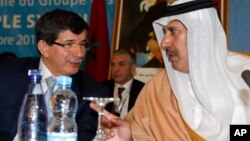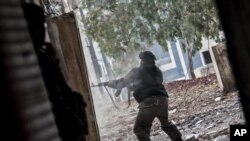A group of more than 100 nations calling for Syrian President Bashar al-Assad to step down has formally recognized a newly formed Syrian opposition coalition as the legitimate representative of the Syrian people.
In another development, a senior U.S. official says the Syrian government recently fired Scud missiles at insurgents. There was no indication the missiles carried chemical weapons.
The use of Scud missiles could be seen as an escalation of the nearly two-year conflict in Syria, and it comes as more international favor has shifted toward the rebels.
"We want to accelerate the political transition in Syria to stop the bloodshed in this country," said Moroccan Foreign Minister Saadeddine el Othmani, host of the "Friends of Syria" conference in Marrakech that endorsed the opposition Syrian National Coalition.
Regional Food Security at a Glance
Regional Food Security at a Glance- Prices are up in Southern Africa on disappointing harvests.
- Markets in West Africa were mostly stable but high, and large numbers of people remain displaced by conflict.
- East Africa saw seasonal declines with the new harvest.
- In the Great Lakes, conflict in the Democratic Republic of Congo means more than 6 million people need food assistance, 2 million more than last year.
- In the Middle East, food security concerns are increasing in Syria due to the civil conflict, Yemen remains a trouble spot.
- Wheat prices are up in the countries of the former Soviet Union on poor harvests.
- Prices are up in Haiti due to damage from tropical storms.
The director of the Brookings Doha Center, Salman Shaikh, said the new coalition's leadership is "satisfied" with the outcome of the meeting.
"It's safe to say this is the most significant Friends [of Syria] meeting there's been. In fact, it's probably the first significant Friends [of Syria] meeting there has been," he said.
Shaikh said various countries involved pledged $143 million in aid for the Syrian opposition, including a $100 million aid package from Saudi Arabia.
US endorsement
U.S. Deputy Secretary of State William Burns said in Marrakech that the sooner the Syrian president "steps aside, the better for all Syrians."
The United States recognized the opposition coalition Tuesday, hours after it labeled a Syrian jihadist force fighting alongside the rebels as a terrorist organization. The State Department said the Islamist Jabhat al-Nusrah is serving as an alias of al-Qaida in Iraq as it attempts to infiltrate the Syrian conflict.
By Wednesday, the leader of the opposition coalition urged the United States to review its decision to label Jabhat al-Nusrah a terrorist group.
"We might disagree with some parties and their ideas and their political and ideological vision, but we affirm that all the guns of the rebels are aimed at overthrowing the tyrannical criminal regime,'' opposition leader Mouaz al-Khatib said.
The U.S. formal recognition of the opposition, made by President Barack Obama in a television interview, stops short of any U.S. commitment to arm the rebels, a move that Shaikh says still significantly aids rebels fighting for democracy on the ground.
"A role by the United States, bringing with it the assets, both the intelligence, as well as the sort of training and assistance aspect which they can bring, is actually quite useful," he said. "The simple fact of the matter is if Assad was to fall tomorrow, we have really no guarantee that we have forces on the ground that can ensure the safety and security that is required for a political process and a political transition process to take root."
Russian disapproval
Russian Foreign Minister Sergei Lavrov said the U.S. recognition of the opposition coalition goes against efforts to establish a political transition in Syria.
"As the coalition has been recognized as the only legitimate representative, it seems that the United States decided to place all bets on the armed victory of this very national coalition," Lavrov said.
Moscow opposes Western demands to impose regime change on the Syrian president, a longtime Russian ally.





